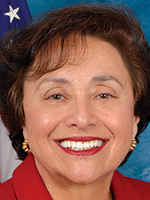Senior Reporter
Transportation Funding Bill Would Increase FMCSA Budget

[Stay on top of transportation news: Get TTNews in your inbox.]
A federal trucking regulator would receive $881 million for operations during the next fiscal year under legislation a House panel approved July 8.
House Democrats’ proposed allocation for the Federal Motor Carrier Safety Administration would be a $202 million increase from the fiscal 2020 enacted level. The proposed funding would amount to $179 million more than the president’s current request, which was a nearly 4% increase from the previous year.
The House Transportation, Housing and Urban Development, and Related Agencies Appropriations Subcommittee easily advanced the bill to a full committee. Lawmakers are expected to propose amendments to the bill during the full committee markup and during floor debate. The panel’s leadership indicated it intends to consider the measure on the House floor as early as this month.
Appropriations Bill by Transport Topics on Scribd
“Our nation is facing an infrastructure crisis, with crumbling roads, aging transit and rail systems, lack of affordable and safe housing, and natural disasters increasing in severity and number, exacerbated by accelerating climate changes,” said subcommittee Chairman David Price (D-N.C.). “[The bill] continues to build on bipartisan progress in recent fiscal years to increase funding for all modes of transportation — highways, aviation, transit, bike and pedestrian projects, rail, and ports — while improving safety and focusing on resiliency across all programs.”
House Appropriations Committee Chairwoman Nita Lowey (D-N.Y.) also applauded the measure’s proposed funding levels.

Lowey
“Together, we can modernize our transportation systems, expand access to safe, affordable housing, and support our most vulnerable neighbors,” she said. “With this bill, we are laying the foundations for sustained economic growth and expanded opportunity for every American in every corner of our nation.”
Overall, the bill would provide $107.2 billion for the U.S. Department of Transportation. That would amount to an increase of $21.1 billion from the fiscal 2020 enacted level and $19.4 billion above the president’s request.
Specifically, the Federal Highway Administration would receive $62.9 billion. The Federal Transit Administration would receive $18.9 billion, and the Federal Aviation Administration would receive $18.1 billion. Additionally, the measure would provide $1 billion for infrastructure grants, matching the president’s request. It also would provide $3 million to back the Highly Automated Systems Safety Center of Excellence, which was established in fiscal 2020.
In a sign of the times, the bill included $75 billion in supplemental aid. The additional funding would target transportation and housing programs affected by the coronavirus pandemic across states and municipalities. Of that emergency funding, $3 billion would be directed for Amtrak’s national operations, $3 billion would be dedicated for infrastructure grants, and $2.5 billion for FAA grants-in-aid for airports.
Meanwhile, bipartisan support is not expected as the bill advances through the chamber. Several senior Republicans criticized the legislation’s funding proposals related to rail, transit and other programs.

Granger
“The best way to advance housing and transportation opportunities for all of our constituents and get funds distributed in a timely manner is to work together,” said Texas Rep. Kay Granger, ranking Republican on the Appropriations Committee. “The programs in this bill are too important to be delayed by partisan politics.”
On the other side of the Capitol, top Democrats have called on Republican Senate leaders to advance the appropriations measures before the expiration of federal funding authority at the end of September. The Republican leadership has yet to schedule consideration of their versions in the upper chamber.
For Congress to avert a shutdown of many federal agencies, lawmakers have to approve funding bills prior to the start of the new fiscal year Oct. 1. An inability to clear for the president’s desk full-year funding bills has resulted in the approval of short-term funding measures.
Want more news? Listen to today's daily briefing:
Subscribe: Apple Podcasts | Spotify | Amazon Alexa | Google Assistant | More




